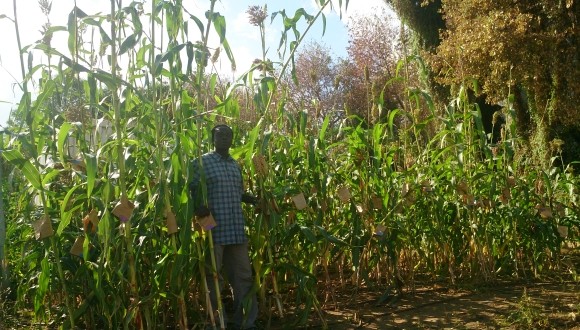Visiting Scholar, Dr. Alexander Bombom, Conducts Research about crop Enhancement of Maize and Sorghum
Dr. Bombom spends six months conducting crop research at TAU
This past summer, the Manna Center Program hosted visiting scholar, Dr. Alexander Bombom, as he researched wide crosses for crop enhancement of maize and sorghum. Dr. Bombom conducted his research alongside Dr. Assaf Distelfeld of TAU's Institute of Cereal Crop Improvement.
Bombom joined us from the Biosciences eastern and central Africa at the International Livestock Research Institute (BecA-ILRI) Hub in Nairobi, Kenya.
Presented below is a summary of the research project Funded by the Bill and Melinda Gates Foundation. Additional support to facilitate the study at Tel Aviv University was provided by the Manna Center Program for Food Safety and Security.
Genetic gains in crop improvement for traits, including, but not limited, to yield increase, pest and disease resistance, plant and grain quality, and resilience to climate change factors are limited by a narrow germplasm base in breeding programs worldwide. Maize and sorghum, important staple cereals in sub-Saharan Africa, have a variety of uses including food, feed, fuel and as industrial grain crops, and contribute significantly to food and nutrition security in the region. However, smallholder farmer yields continue to dwindle in recent years attributed to climate change and human factors such as replacement of adapted land race cultivars with wide spread adoption and use of homozygous modern cultivars that may not be compatible with local farming practices.
Wide crosses provide an opportunity to address this challenge with the benefit of gene transfer, induction of haploids, creation of novel species and generation of novel sources of variation. The goal of the present project was to use wide crosses between maize and sorghum to generate novel sources of genetic variation for improvement of either one of two crop species. Sorghum can grow in marginal soils and with stands heat and drought stress. Maize has important grain quality attributes that would be beneficial for sorghum grain quality improvement such as digestibility.
The researchers envision that a cross between maize and sorghum will provide progeny genotypes with superior characteristics than either one of the parent species. Bombom reported observation of a successful cross between maize and sorghum yielding fertile progeny able to propagate beyond the F1 generation. The current work at Tel Aviv University focused on using flow cytometry as a tool to determine true hybridity of F1 plants and subsequent F2 progeny. Important data from flow cytometry analysis will include genome size and ploidy of putative progeny relative to parent species. Phenotypic characterisation of F1 and F2 progeny indicate variation among F1 progeny and segregation among F2 progeny for number of characteristics including plant vigor and grain size.
The observations suggest successful induction of novel genetic variation from crosses between sorghum and maize. Application of the maize-sorghum innovation will be beneficial to breeding programs across sub-Saharan Africa and elsewhere in contributing to genetic variation in germplasm for crop enhancement. For self pollinating crops such as sorghum the approach can expedite the development of novel varieties and significantly contribute to food and nutrition security and subsequently livelihoods for millions of smallholder farmers in sub-Saharan Africa.
We wish Dr. Bombom the best of luck in his future research.





